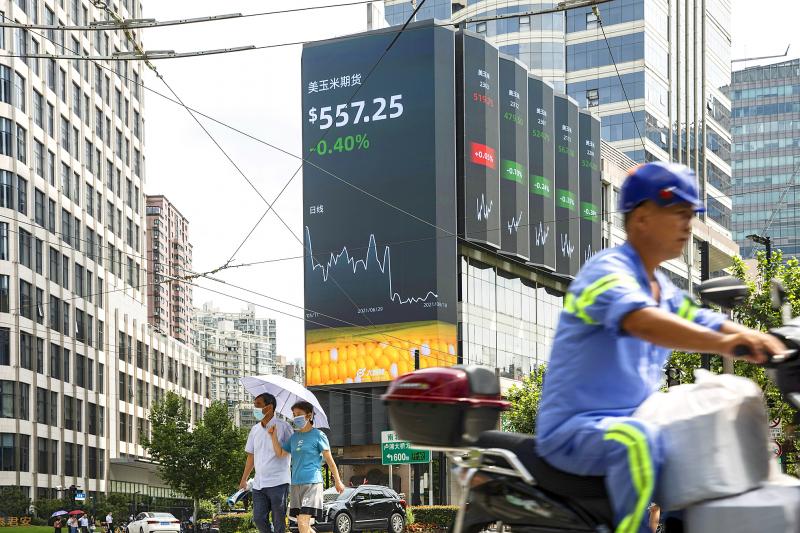China’s tough virus curbs mean that economic activity in the third quarter could be close to flat compared with the previous three months, while full-year growth may fall below 8 percent, a top forecaster said.
“My view is that the Chinese economy should slow sharply in the third quarter, mainly due to the virus but also controls on property,” Market Securities LLP chief economist Christophe Barraud said.
Barraud was Bloomberg’s top-ranked forecaster for the Chinese economy last year.

Photo: Bloomberg
Barraud’s prediction of 0.3 percent growth in the period between July and September from the previous three months is below the median estimate of 1.1 percent in a Bloomberg survey of economists.
Barraud is also bearish on China’s growth for this year compared to the market’s median estimate of 8.4 percent.
“It should be close to 8 percent, but with risks tilted to the downside,” he said. “If there is another outbreak in the fourth quarter, forecasts should be adjusted below 8 percent.” The government has set a target of above 6 percent growth for the year.
Barraud’s prediction came after monthly data showed China’s economy slowing sharply last month, with a slump in retail sales and property construction.
China introduced tougher curbs on travel to squash an imported outbreak of the Delta variant of SARS-CoV-2 from late July. While the measures quickly brought the virus under control, a new cluster has developed in southern China this month, suggesting some restrictions will remain and consumers will continue to be cautious.
“Risks are tilted to the downside because China will keep implementing a zero-tolerance policy concerning COVID-19, particularly ahead of the Winter Olympics in February,” Barraud said.
The France-based economist said that one of his favorite indicators of Chinese economic activity at the moment is the daily number of domestic flights.
“It’s the most reliable data to catch the impact of restrictive measures,” he said.
China is scheduled to release third-quarter gross domestic product data on Oct. 18. In the second quarter, GDP rose 7.9 percent from the same period last year, and 1.3 percent from the previous quarter.
Barraud said his forecasting technique involves trying to collect as much data as possible, including from private providers, before constructing a simple model with just five inputs for each predicted economic variable.
Those forecasts are adjusted based on experience and comparison with competitors, he said.
For the remainder of the year, infrastructure investment and fiscal spending are to be key variables indicating the extent to which Beijing is trying to support growth, he said.
The focus could be more on public investment “because everyone is waiting for public support,” he said.

Taiwan will prioritize the development of silicon photonics by taking advantage of its strength in the semiconductor industry to build another shield to protect the local economy, National Development Council (NDC) Minister Paul Liu (劉鏡清) said yesterday. Speaking at a meeting of the legislature’s Economics Committee, Liu said Taiwan already has the artificial intelligence (AI) industry as a shield, after the semiconductor industry, to safeguard the country, and is looking at new unique fields to build more economic shields. While Taiwan will further strengthen its existing shields, over the longer term, the country is determined to focus on such potential segments as

UNCERTAINTY: Innolux activated a stringent supply chain management mechanism, as it did during the COVID-19 pandemic, to ensure optimal inventory levels for customers Flat-panel display makers AUO Corp (友達) and Innolux Corp (群創) yesterday said that about 12 to 20 percent of their display business is at risk of potential US tariffs and that they would relocate production or shipment destinations to mitigate the levies’ effects. US tariffs would have a direct impact of US$200 million on AUO’s revenue, company chairman Paul Peng (彭雙浪) told reporters on the sidelines of the Touch Taiwan trade show in Taipei yesterday. That would make up about 12 percent of the company’s overall revenue. To cope with the tariff uncertainty, AUO plans to allocate its production to manufacturing facilities in

COLLABORATION: Given Taiwan’s key position in global supply chains, the US firm is discussing strategies with local partners and clients to deal with global uncertainties Advanced Micro Devices Inc (AMD) yesterday said it is meeting with local ecosystem partners, including Taiwan Semiconductor Manufacturing Co (TSMC, 台積電), to discuss strategies, including long-term manufacturing, to navigate uncertainties such as US tariffs, as Taiwan occupies an important position in global supply chains. AMD chief executive officer Lisa Su (蘇姿丰) told reporters that Taiwan is an important part of the chip designer’s ecosystem and she is discussing with partners and customers in Taiwan to forge strong collaborations on different areas during this critical period. AMD has just become the first artificial-intelligence (AI) server chip customer of TSMC to utilize its advanced

Chizuko Kimura has become the first female sushi chef in the world to win a Michelin star, fulfilling a promise she made to her dying husband to continue his legacy. The 54-year-old Japanese chef regained the Michelin star her late husband, Shunei Kimura, won three years ago for their Sushi Shunei restaurant in Paris. For Shunei Kimura, the star was a dream come true. However, the joy was short-lived. He died from cancer just three months later in June 2022. He was 65. The following year, the restaurant in the heart of Montmartre lost its star rating. Chizuko Kimura insisted that the new star is still down